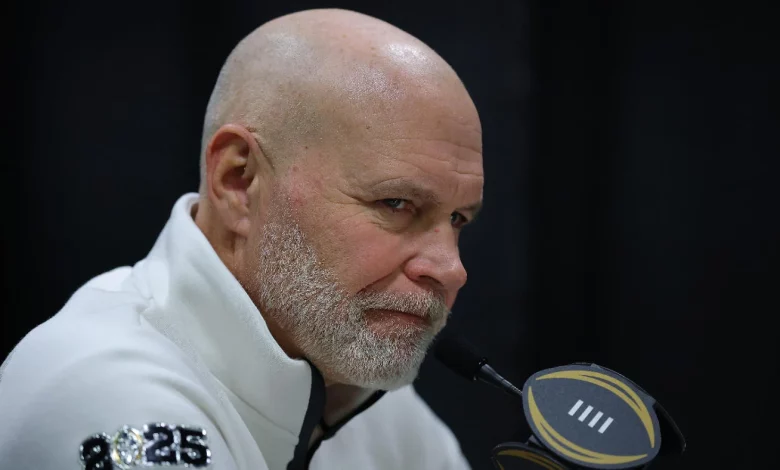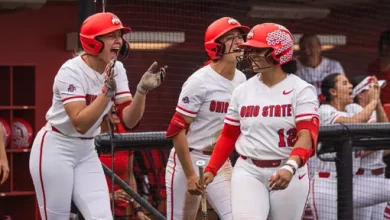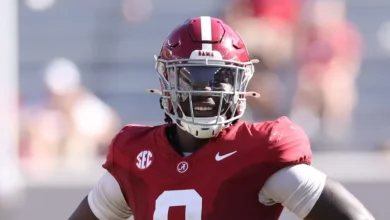College football coordinator hiring who could influence the 2025 season: Penn State and Alabama make significant moves.

The world of college football coaching is always in a state of flux, and one of the most critical components of a team’s success lies within its coordinator positions. These coaching roles are often the difference between a good team and a great one. In recent years, programs like Penn State and Alabama have seen significant shifts in their coaching staffs, particularly in their coordinator positions. These moves are poised to influence not only their own programs but the broader landscape of college football, especially in the lead-up to the 2025 season.
Coordinators are responsible for crafting and executing the offensive and defensive strategies that shape a team’s identity. At powerhouse programs like Penn State and Alabama, hiring the right coordinator can lead to championship contention, while the wrong hire can derail even the most talented rosters. Let’s dive into the strategic decisions made by these two programs, examining the hires and how they could impact their respective futures.
Alabama’s Coordinator Shake-Up: A New Offensive Vision for the Crimson Tide
Nick Saban’s Alabama Crimson Tide have long been the gold standard in college football. From an unmatched tradition of success to an ever-present NFL pipeline, Alabama has set the tone for the modern college football era. However, in recent years, the program has faced challenges in maintaining its stranglehold on the sport. The hiring of new coordinators for the 2025 season could be the key to returning to prominence, especially after the departure of key figures.
The Offensive Coordinator Position: Tommy Rees’ Arrival
One of the most significant moves for Alabama heading into the 2025 season is the hire of Tommy Rees as the new offensive coordinator. Rees, who previously served as Notre Dame’s offensive coordinator, brings a wealth of experience and a new perspective to an Alabama offense that has seen some inconsistency in recent seasons. With the departure of Bill O’Brien, who held the role in recent years, Saban turned to Rees to modernize the offense and bring balance to a traditionally run-heavy unit.
Rees’s background in both pro-style and spread offenses will be crucial for Alabama as it transitions to a more dynamic, versatile attack. At Notre Dame, Rees helped develop a quarterback-friendly system, optimizing the play of Ian Book and helping the Fighting Irish secure multiple double-digit win seasons. He also helped Notre Dame build a more balanced offense, emphasizing the running game while opening things up in the passing attack when necessary. The key to Rees’s success at Alabama will be his ability to work with talented quarterbacks and help elevate their play, especially in a conference as competitive as the SEC.
Alabama has always relied on its stable of talented running backs and offensive line dominance, but Rees’s system will aim to bring more creativity and flexibility to the table. He is likely to incorporate more spread concepts, which should help showcase the dynamic skill sets of Alabama’s talented receiving corps. With the potential for explosive plays from both the passing and running games, Rees’s arrival could be a game-changer for the program, especially in the competitive SEC West.
The quarterback position will be crucial for Rees’s success. If Alabama can solidify the starting role and get consistent play under center, Rees’s scheme could fully unlock the offense’s potential. The combination of a strong running game, effective passing attack, and a defense that is typically elite makes Alabama one of the most complete teams in college football, provided the offense can catch up to the defense.
The Impact of Rees on Alabama’s National Championship Hopes
While Alabama remains a dominant force, their offense has had to evolve in response to the changing landscape of college football. Rees’s ability to mesh traditional power football with modern spread principles will go a long way in ensuring that Alabama remains a national contender. His success or failure in implementing his offense will influence whether Alabama can return to the top of college football in 2025 and beyond.
Saban’s coaching tree has produced a wealth of successful coaches, and Rees now has the opportunity to carve out his legacy by leading the Alabama offense to a new level of excellence. With talent at nearly every position on offense and a defense that is annually one of the best in the nation, Alabama’s coordinator hire could be the piece that pushes them back to the forefront of college football.
Penn State’s New Defensive Coordinator: Manny Diaz’s Impact on the Nittany Lions
While Alabama made waves with its offensive hire, Penn State also made a strategic coaching move that could significantly impact its program. Under head coach James Franklin, Penn State has experienced consistent success, but the Nittany Lions have often been held back by their inability to take the next step in the Big Ten and college football at large. Franklin’s hire of Manny Diaz as the new defensive coordinator for the 2025 season could be just what the program needs to elevate its defense and bring Penn State closer to championship contention.
Manny Diaz’s Defensive Philosophy
Manny Diaz is one of the most respected defensive minds in college football, having served as the defensive coordinator for several programs, including Miami and Texas. His aggressive, high-pressure defensive schemes focus on creating havoc for opposing offenses. Diaz is known for implementing a system that emphasizes speed, athleticism, and versatility, which has allowed his defenses to consistently rank among the nation’s best.
Diaz’s defensive units are characterized by their ability to create turnovers, disrupt the quarterback, and stifle opposing offenses through a variety of blitzes and schemes. In today’s fast-paced, high-scoring college football world, Diaz’s approach is a breath of fresh air, as it brings a physical, aggressive style that is difficult for offenses to predict and handle. His familiarity with the Big Ten and his experience coaching in high-pressure environments make him a perfect fit for Penn State.
At Miami, Diaz was able to transform a defense that had been underperforming into one of the most feared units in the country. His ability to develop talent and maximize the potential of his players will be key for Penn State, which has some of the best defensive talent in the Big Ten. Under Diaz, Penn State can expect an emphasis on attacking defenses that don’t simply sit back and react but take the game to the opposing offense.
The Synergy with James Franklin’s Vision
James Franklin has built Penn State into a competitive program in the Big Ten, but one area that has held them back from elite status is consistency on the defensive side of the ball. While Penn State has produced several talented defensive players in recent years, the defense has often been inconsistent, especially against the top-tier programs in the Big Ten.
By hiring Diaz, Franklin is making a clear statement that Penn State is committed to being an elite program, one that can not only compete with Michigan and Ohio State but also rise to the level of national championship contention. Diaz’s defensive philosophy will complement Franklin’s emphasis on developing a balanced team, one that can dominate both on offense and defense.
With Diaz at the helm of the defense, Penn State will have the chance to take its defense to the next level. His aggressive approach will challenge the conference’s best offenses and could be the tipping point that allows Penn State to finally break through and win a Big Ten championship, potentially pushing the program into the College Football Playoff.
The Bigger Picture: The Strategic Importance of Coordinator Hires
While the hires at Alabama and Penn State will undoubtedly have a significant impact on their respective programs, they are also indicative of a larger trend in college football. Programs are becoming more discerning in their approach to hiring coordinators, recognizing the influence that these key figures have on their long-term success.
At Alabama, Saban’s choice to hire Rees speaks to his understanding of the importance of modernizing the offense while still maintaining the foundational elements that have made Alabama so successful over the years. Rees brings a balance to the table that could make Alabama’s offense both potent and unpredictable, ensuring that the Crimson Tide remains a perennial contender.
Similarly, Penn State’s hire of Diaz reflects the program’s desire to take the next step as a national powerhouse. Diaz’s aggressive defensive schemes and ability to develop players will give Penn State a defensive identity that can compete with the elite programs in the Big Ten and beyond.
Both hires signal a shift in college football where coordinators are seen as integral parts of a program’s success. In the highly competitive environment of college football, where recruiting, player development, and on-field strategy all play significant roles in success, the right coordinator can be the difference between a good season and a championship run.









